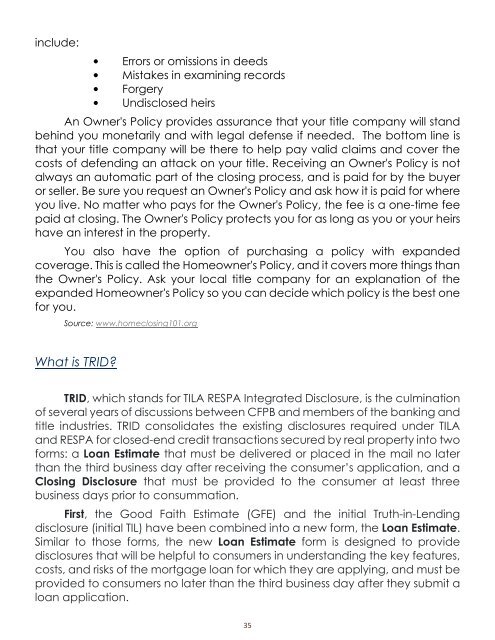You also want an ePaper? Increase the reach of your titles
YUMPU automatically turns print PDFs into web optimized ePapers that Google loves.
include:<br />
• Errors or omissions in deeds<br />
• Mistakes in examining records<br />
• Forgery<br />
• Undisclosed heirs<br />
An Owner's Policy provides assurance that your title company will stand<br />
behind you monetarily and with legal defense if needed. The bottom line is<br />
that your title company will be there to help pay valid claims and cover the<br />
costs of defending an attack on your title. Receiving an Owner's Policy is not<br />
always an automatic part of the closing process, and is paid for <strong>by</strong> the buyer<br />
or seller. Be sure you request an Owner's Policy and ask how it is paid for where<br />
you live. No matter who pays for the Owner's Policy, the fee is a one-time fee<br />
paid at closing. The Owner's Policy protects you for as long as you or your heirs<br />
have an interest in the property.<br />
You also have the option of purchasing a policy with expanded<br />
coverage. This is called the Homeowner's Policy, and it covers more things than<br />
the Owner's Policy. Ask your local title company for an explanation of the<br />
expanded Homeowner's Policy so you can decide which policy is the best one<br />
for you.<br />
Source: www.homeclosing101.org<br />
What is TRID?<br />
TRID, which stands for TILA RESPA Integrated Disclosure, is the culmination<br />
of several years of discussions between CFPB and members of the banking and<br />
title industries. TRID consolidates the existing disclosures required under TILA<br />
and RESPA for closed-end credit transactions secured <strong>by</strong> real property into two<br />
forms: a <strong>Loan</strong> Estimate that must be delivered or placed in the mail no later<br />
than the third business day after receiving the consumer’s application, and a<br />
Closing Disclosure that must be provided to the consumer at least three<br />
business days prior to consummation.<br />
First, the Good Faith Estimate (GFE) and the initial Truth-in-Lending<br />
disclosure (initial TIL) have been combined into a new form, the <strong>Loan</strong> Estimate.<br />
Similar to those forms, the new <strong>Loan</strong> Estimate form is designed to provide<br />
disclosures that will be helpful to consumers in understanding the key features,<br />
costs, and risks of the mortgage loan for which they are applying, and must be<br />
provided to consumers no later than the third business day after they submit a<br />
loan application.<br />
35


